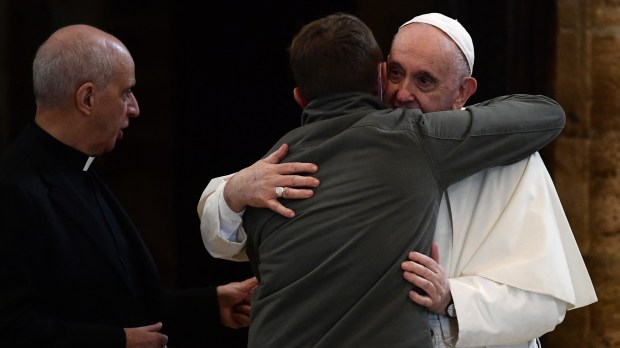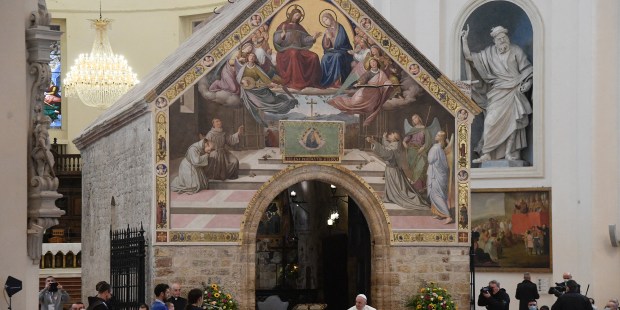Inside the Basilica of Santa Maria degli Angeli (Holy Mary of the Angels), where St. Francis understood his vocation and renounced the world in order to live in poverty among the poor, Pope Francis listened to six testimonies, of people from Italy, France, Poland and Spain.
With the church that St. Francis repaired as a backdrop, he recounted one of the saint’s teachings:
I would like to recall one of them that expresses well the personality of the Poverello (Cf. Little Flowers, chapter 13: Fonti Francescane, 1841-1842. He and Brother Masseo had embarked on a journey to go to France, but they had not taken any provisions with them. At a certain point, they had to begin to ask for charity. Francis went in one direction and Brother Masseo in another. But, as the Little Flowers recount, Francis was small of stature and those who did not know him took him to be a “tramp”; instead, Brother Masseo “was a tall and handsome man.” Thus it was that Saint Francis succeeded in obtaining some pieces of stale and hard bread, while Brother Masseo was given some beautiful pieces of bread.
When the two found themselves together again, they sat down on the ground and placed what they had collected on a rock. Seeing the pieces of bread his brother had collected, Francis said: “Brother Masseo, we are not worthy of this great treasure.” The brother, marveling, responded: “Father Francis, how can you speak of a treasure where there is such poverty and even what is necessary is lacking?” Francis replied: “It is precisely this that I consider a great treasure, that there is nothing, but what we have has been given by Providence who has given us this bread.”
This is the teaching that Saint Francis gives us: knowing how to be content with the little we have and to share it with others.
Roll up your sleeves
But Pope Francis’ message was above all one of action. He urged society to do better with regard to the poor and those who are trampled upon in so many ways:
Rather it is time that the poor be given back their voice, because for too long their requests have remained unheard. It is time that eyes be opened to see the state of inequality in which many families live. It is time for sleeves to be rolled up so dignity can be restored by creating jobs. It is time to be scandalized once again before the reality of children who are starving, reduced to slavery, tossed about in the water in the aftermath of a shipwreck, innocent victims of every sort of violence. It is time that violence against women cease and that they be respected and not treated like bargaining chips. It is time that the circle of indifference be broken so as to discover once again the beauty of encounter and dialogue. It is time to meet each other. It is the time to meet. If humanity, if we men and women do not learn to meet each other, we are heading for a very sad end.
Open your doors
The Holy Father also urged a Christ-like ministry to the poor, in the footsteps of St. Francis.
1. Talk and pray
Let us not forget that the first marginalization the poor suffer from is spiritual marginalization. For example, many people and many young people find a bit of time to help the poor and bring them food and hot beverages. This is very good and I thank God for their generosity.
But I especially rejoice when I hear that these volunteers stop a bit and speak with the people, and sometimes pray together with them… So, even our being here at the Portiuncula, reminds us of the Lord’s company, that He never leaves us alone, he always accompanies us in every moment of our lives.
2. Open hearts
Noting how St. Francis welcomed Clare, his first brothers, and the poor, the Pope called for us to imitate him.
This is the most evangelical expression we are called to make our own: hospitality. Hospitality means to open the door, the door of our house and the door of our heart, and to allow the person who knocks to come in. And that they might feel welcome, not ashamed.


